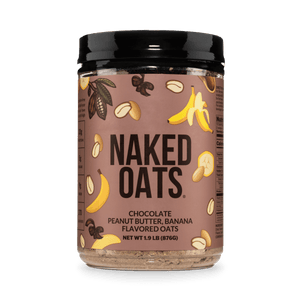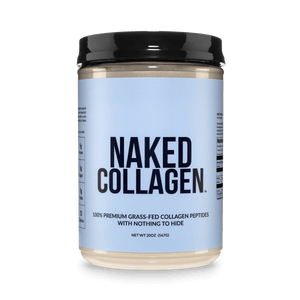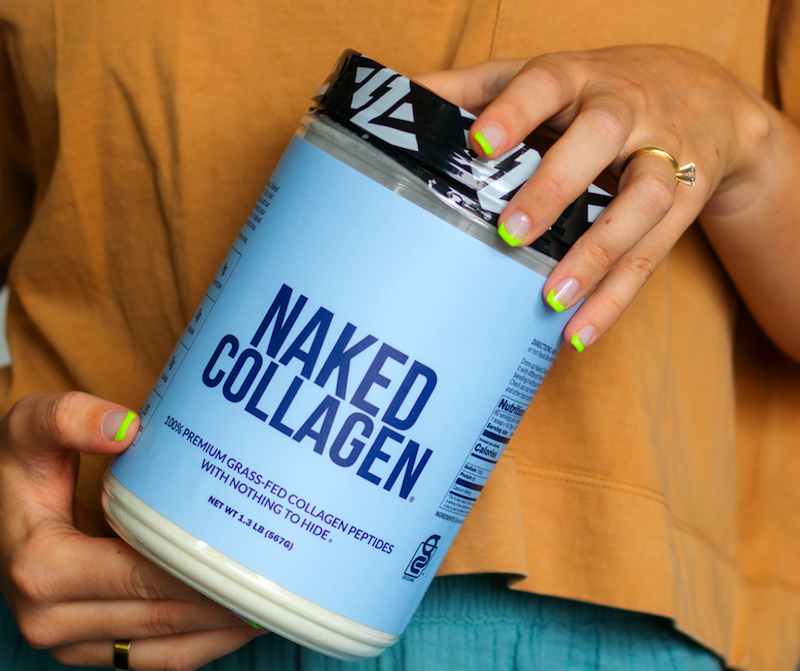What is Collagen?
Collagen is the most abundant protein in your body, acting as a crucial building block for your skin, bones, muscles, tendons, and ligaments. But it’s not just structural, collagen also helps with cell renewal and maintaining the elasticity and strength of your skin and connective tissues.
There are many different types of collagen, all have specific areas of the body they can be found in and functions. Type 1 is the most common, making up around 90%, this type forms the dense structures in the skin, bones, tendons, and ligaments.
As we age, our collagen production begins to decline by ~1-1.5% every year, this can lead to more profound wrinkles, decreased mobility, stiff joints, aching muscles, issues with digestion/gut health and more(1).
Main Benefits of Collagen

Collagen has many benefits, some have been researched more heavily than others, but collagen packs a punch when it comes to overall health and wellness. It’s not a magic pill, but it’s definitely worth incorporating into your routine.
For Your Skin
Collagen is a staple in skincare for a reason, it helps preserve your youthfulness and resilience, thanks to being packed with the powerhouse amino acids proline and lysine. These amino acids strengthen your skin's structure through a process called hydroxylation, which basically toughens up the collagen fibers, giving your skin its bounce and resistance against all the wear and tear life throws at it.
Type I collagen is your skin’s structural enforcer—imagine it as the framework that keeps everything tight and right, from your forehead down to your toes. It’s also the stuff making your bones tough enough to dance all night or lift those heavy weights. Then there's Type II collagen in your cartilage, making your joints glide smoothly like a well-oiled machine, and Type III that backs up Type I to keep your skin supple(2).
This isn't just about looking good—it's about making sure your skin can take on life’s challenges, from UV rays to pollution and stress. And with today’s tech, we can peek under the skin’s surface with fancy imaging tools to really see how well your collagen is holding up as you age. It’s this kind of intel that helps us understand why our skin changes over time and what we can do to keep it as youthful as possible. Trust me, it's not just vanity—it's about being strong, inside and out.
Joint Protection

Collagen is a protein found in cartilage, the cushiony material that prevents your bones from rubbing together. So, why is it known for joint health? As we age or stress our joints through activities like running or lifting, that cartilage can wear down, leading to stiffness and pain— you may have heard some refer to it as creaky knees!
That's where collagen steps in. By supplementing with collagen, you’re giving your body the building blocks it needs to maintain and repair cartilage. The hydrolyzed collagen, with its biologically active peptides, goes straight to work in your joints(3).
It not only helps rebuild and fortify the cartilage but also supports overall joint health by improving flexibility and reducing inflammation. It’s like reinforcing your body’s shock absorbers, making sure they’re plush and ready to handle whatever your workout throws at them.
Nail Growth
Ready for a little beauty booster that goes beyond skin deep? Let’s talk about collagen and its magic for nails and hair!
A study showed that bioactive collagen peptides gave nails a serious boost, ramping up their growth by 12% and slashing breakages by 42%. That's not all—most folks noticed their nails looked better and felt happier with their results post-treatment(4).
Hair Benefits
Hair loss can toss a big bucket of stress into your life, and let’s be honest, the usual fixes often fall short. Yet somehow, around 50% of men and women deal with this problem at some point in their life. Now, more research needs to be conducted on this, but there is some evidence and studies suggesting that collagen can be beneficial, especially in combination with other supplements(5).
Gut Health

You know the drill—bloating, stomach cramps, the works. Turns out, around 40% of us globally wrestle with these horrible symptoms, even with conditions like irritable bowel syndrome and functional dyspepsia.
But, collagen supplementation can actually help with your overall gut health.
Your gut is the center for all your body's nutrients, and it's lined with this thing called the intestinal epithelium. Think of it as the bouncer at the club, keeping toxins out while letting the good and beneficial things in. Tight junctions are the VIP ropes—when they're doing their job, your gut's barrier is tight and protected, making sure nothing sneaks in. But if inflammation arises, suddenly, it's like someone let the ropes down—which can lead to increased gut permeability and the symptoms mentioned earlier(6).
Collagen has been shown to benefit more than just your skin and joints, it can also give your gut barrier a boost, by helping tighten up the tight junctions and keep the bad stuff out.
So, whether you're looking to relieve yourself of the belly bloat or just keep your digestive system running smoothly, collagen peptides are worth putting into your routine.
How Much Collagen Should I Take Per Day?

For Skin Health
To reap the dermatological benefits of collagen, a daily supplement of about 10-15 grams can help enhance skin elasticity and hydration.
Joint Protection
If you’re looking for joint health, a slightly higher dose, around 10-20 grams of collagen, can be beneficial, especially if combined with other joint-supporting nutrients like vitamin C and hyaluronic acid.
Nail Growth
For nail growth and strengthening, a dose as low as 2.5 grams daily showed improvements according to the research.
Hair Benefits
If you want to give your hair extra love by supplementing it with collagen, you can simply follow the instructions on the label of the product you’re using. With Naked Nutrition Collagen Peptides, that’s by mixing one to two scoops into 4-8oz of coffee or your favorite hot beverage.
Gut Health
If you want to see improvements in your bloating, digestion, and overall gut health, incorporate around 20 grams of collagen daily.
It’s always best to follow the instructions on the product label and consult with your healthcare professional when making changes to your health and wellness routine.

How Long Does Collagen Take to Work?
Consistency is key when it comes to collagen supplements. Initial improvements, especially in skin condition and joint pain, can be noticed as soon as four to six weeks. However, significant changes often take three to six months of consistent use.
Bovine Collagen vs. Marine Collagen

Bovine Collagen
Derived from cows, bovine collagen is primarily a type I and III collagen, which is ideal for skin, hair, and nails, as well as for bones and joints. It's generally more cost-effective and widely available.
Marine Collagen
Sourced from fish, marine collagen is primarily type I collagen, which is the most abundant collagen in the human body. It’s known for its superior absorption and bioavailability and is especially beneficial for skin health. It's a great choice for those looking for pescatarian-friendly options.
At What Age Should I Start Taking Collagen?
There’s no one-size-fits-all answer, but starting in your mid-20s to early 30s can be beneficial as this is when natural collagen production begins to decline.
Early supplementation can help slow down the aging process and maintain an active, healthy lifestyle.
Symptoms of Collagen Deficiency
You might start noticing changes such as increased wrinkles and dryness, weaker nails and hair, joint pain, muscle aches, and slower wound healing.
If you notice these symptoms, boosting your collagen intake might be a good step.
Collagen vs Whey Protein: The Main Differences

While both collagen and whey protein provide essential proteins, their benefits differ.
Whey is ideal for muscle building and recovery after workouts due to its rich and complete amino acid profile.
Collagen, on the other hand, offers more specialized amino acids that support skin, joint, and bone health.But, it’s important to recognize that it isn’t a complete protein due to lacking some amino acids.
When Should I Take Collagen for Best Results?
The optimal time to take collagen depends on your goals and lifestyle. If you're looking to improve skin health, taking collagen before bedtime may be more ideal for a consistent routine.
For joint and muscle recovery, consider consuming collagen post-workout to serve as a reminder to take it.
Timing doesn’t matter as much as making sure you’re consistent with it, so making sure it fits into your routine is the most important.
In conclusion, whether you're looking to enhance your beauty routine, support joint health, or simply invest in your long-term wellness, incorporating collagen into your daily regimen can offer a wealth of benefits. Remember, consistency is key to seeing the transformative effects of this supplement.













